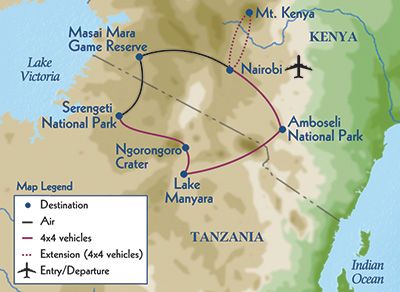Day 1: Depart U.S. for Nairobi, Kenya
Day 2: Arrive Nairobi
After arriving in Nairobi, we transfer to our hotel. As arrival times may vary greatly, we have no group activities or meals planned.
Day 3: Nairobi
We see highlights of Kenya’s cosmopolitan capital city today, stopping for a tour of the Karen Blixen Museum, the one-time home of the Danish writer who, as Isak Dinesen, wrote Out of Africa. We also visit the Giraffe Centre, where we see several of the endangered Rothschild’s giraffes here up close. Tonight, we enjoy a welcome dinner at our hotel. B,D
Day 4: Nairobi/Amboseli
We transfer this morning to Amboseli National Park in the shadow of snowcapped Mt. Kilimanjaro, the Maasai’s “white mountain” and the world’s tallest freestanding mountain at 19,336 feet. Known for its many elephants, Amboseli boasts wide, dry plains also teeming with herds of wildebeest, zebra, impala, and giraffe, as we may see on this afternoon’s game drive. B,L,D
Day 5: Amboseli
Early this morning we visit a nearby Masai village. Later: game drive and time for relaxing at our lodge in the foothills of Kilimanjaro beneath a copse of feathered acacia trees. B,L,D
Day 6: Amboseli/Lake Manyara
We travel today to peaceful Lake Manyara National Park, one of Tanzania’s smallest and most diverse parks. Bordered by the dramatic Western Escarpment of the Great Rift Valley, Lake Manyara is notable for its abundant birdlife, diverse vegetation, tree-climbing lions, plains animals, and hippos. B,L,D
Day 7: Lake Manyara/Ngorongoro Conservation Area
This morning we enjoy a second game drive at Lake Manyara then set out for Ngorongoro, a UNESCO Conservation Area, International Biosphere Reserve, and site of Ngorongoro Crater, the world’s largest intact volcanic caldera. On the crater’s floor is Africa in microcosm: grassland, swampland, lakes, forest, mountains, and unparalleled wildlife. B,L,D
Day 8: Ngorongoro Crater
On our morning tour of the 100-square-mile crater we have our only chance to see all of Africa’s “Big Five” – elephant, buffalo, rhino, lion, and leopard – in one place. B,L,D
Day 9: Ngorongoro/Serengeti National Park
We’re bound this morning for the Serengeti, the Masai’s 5,700-square-mile “endless plain” considered Africa’s finest park and one of the world’s last great wildlife refuges. En route we visit 31-mile Olduvai Gorge, where in 1959 anthropologist Mary Leakey discovered the 1.8-million-year-old skull of Australopithecus boisei – and revolutionized the study of human evolution. Reaching our lodge, we embark on an afternoon game drive. B,L,D
Day 10: Serengeti
Twice a year, some two million wildebeest, 200,000 zebra, and 300,000 Thomson’s gazelle migrate to new grazing lands between Masai Mara and the Serengeti, sparking one of nature’s most spectacular sights. But the Serengeti’s vast treeless plains teem with animal life year-round, and this is the best place to see lion and cheetah up close. Perhaps we will on today’s two game drives. B,L,D
Day 11: Serengeti/Masai Mara
We leave Tanzania today, crossing into Kenya and continuing on to Masai Mara by air. Kenya’s premier game reserve rich with animal life, the Mara is the traditional homeland of the native Maasai people. Known especially for the annual migration that sees some two million wildebeest, plus hundreds of thousands of other plains game migrate here from the Serengeti (Masai Mara being the continuation of the Serengeti in Kenya), the Mara sits in the Great Rift Valley and comprises 583 square miles of vast plains, acacia forests, grass-covered hills, and slow-flowing rivers. We arrive at our tented camp late this morning then have our first game drive here later this afternoon. B,L,D
Day 12: Masai Mara
We spend today “on safari,” venturing out on early morning and late afternoon game drives during prime viewing hours. B,L,D
Day 13: Masai Mara
Again today we’re “on safari,” with morning and afternoon game drives in this reserve that is just slightly larger than the state of Rhode Island. B,L,D
Day 14: Masai Mara/Nairobi
Today we reenter the urban world as we fly from the Mara back to Nairobi. Tonight we toast our safari adventure at a farewell dinner. B,L,D
Day 15: Nairobi/Depart for U.S.
After a morning at leisure, we transfer to the Nairobi airport and board our connecting flight to the U.S. B
Day 16: Arrive U.S.
We reach the U.S. today and connect with our flights home.
When To Go On Safari …
January to February
: Summer – dry and warm; cooler at Ngorongoro because of elevation. Migration picks up, with plenty of game throughout central/southern Serengeti
March
: Rains become possible, bringing plains animals in search of fresh grass and food. Significant movement of antelope and other game to the plains for calving season; predators follow
June to October
: Dry season; can be cold on the rim of Ngorongoro. Wildebeest and plains game begin migrating in search of water. By late July, wildebeest migration is in full swing, with opportunities for excellent game viewing and predator kills, especially in the Masai Mara
November to December
: Season of the “short” rains (brief daily thunderstorms); comfortable temperatures at Ngorongoro; warm in the Serengeti, with plentiful game
B = Breakfast included L = Lunch included D = Dinner included



 Destination & Sightseeing
Destination & Sightseeing ITINERARY
ITINERARY

